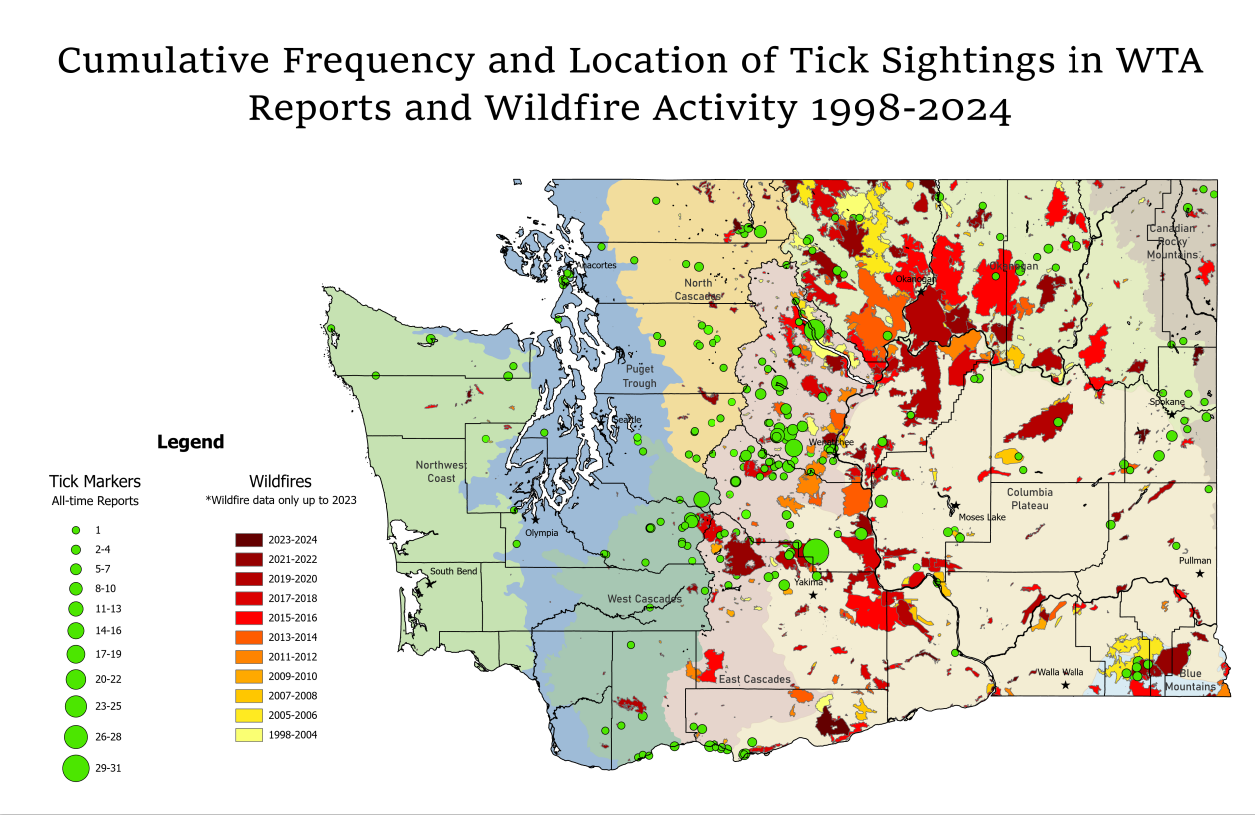
What if your next hiking trip could help advance public health? For Alex Eisen, a Master of Public Health (MPH) student in epidemiology at the University of Washington School of Public Health (UW SPH), this idea was at the heart of her practicum experience. Eisen collaborated with the Washington Trails Association (WTA) and the Washington State Department of Health (WA DOH) to develop tools that analyzed hiker-submitted trip reports for tick sightings and created valuable resources to understand and mitigate tick-borne disease risks.
In this Q&A, Eisen shares why it’s important to understand the tick burden in Washington state, how her practicum is addressing this issue, her experience working with WTA and WA DOH, and her advice for fellow MPH students.
What first drew you to public health and why do you enjoy studying it?
My first exposure to public health came from reading Survival of the Sickest by Sharon Moalem the summer before high school. That book was one of the required summer reading options for my freshman year honors biology class, and it captivated me from the very first word. In that same biology class, we were asked to complete a project on a pathogen of our choosing, and I had selected Toxoplasma gondii. I credit that biology teacher for facilitating my interest in disease and public health through the class, and I knew immediately I wanted a career in that field.
Why did you decide to pursue your MPH degree from UW SPH?
In the beginning I didn’t know that public health was a degree I could obtain. I started my journey at the UW with a focus on biochemistry because at the time, I believed that was the closest I could get to aligning a degree with my interests. I quickly realized after finishing the chemistry series that biochemistry was not for me and soon discovered the Public Health-Global Health major.
Once I completed the introductory epidemiology course, I knew that epidemiology was what I felt fulfilled doing, and obtaining an MPH in epidemiology was necessary for me to achieve my goals. I enjoyed the UW’s undergraduate public health curriculum and felt that the MPH curriculum would also prepare me well for a future career in public health. I have a lot of interest in the environmental health realm of public health, and the environmental health faculty and courses at the UW were always incredible.
Tell us about your practicum. What impact do you hope it will have?
The primary goal of this practicum was to create code that could find the keywords “tick” or “ticks” within free text responses from over 250,000 trail reports provided by the Washington Trails Association (WTA), and to make that code transferable to the Washington State Department of Health (WA DOH) for future projects. Creating this code is helpful for public health organizations because it can help them understand community responses or feedback more quickly. It is useful for public health organizations dealing with large datasets because it automates the process of data extraction and produces a more concise dataset containing only keywords of interest. I wanted to gain more experience in spatial epidemiology, so I also created a map to identify ticks in Washington state. The map’s tick markers use data obtained from hiker reports submitted to the Washington Trails Association (WTA), which was gathered using the text mining code. I hope that this map will be a helpful tool for hikers in Washington to be informed and prepared for the risk of tick exposure based on the area they will be hiking in and reports from other hikers.

I am also optimistic that this project will influence more hikers to utilize the trip report function that the WTA offers and place a greater emphasis on reporting insects of public health importance that are encountered on hikes, such as biting flies, mosquitoes, or ticks.
Why is understanding the tick burden in Washington state an important public health issue?
Washington state has multiple species of ticks that serve as vectors for potentially serious diseases, such as Lyme disease and Rocky Mountain Spotted Fever that can significantly impact the lives and health of those who contract these diseases. Understanding the locations and habitats of vectors like ticks is critical for controlling the transmission of vector-borne diseases. The transmission dynamics of vector-borne diseases rely heavily on the vector’s habitat within the environment, which may be influenced by future changes in climate. It is important for future public health practice that a baseline is established so comparisons may be made as these changes occur. Hiker reports on tick sightings can provide valuable information to the WA DOH regarding tick frequency and distribution on trails throughout Washington.
Describe your experience working with the Washington Trails Association. How will it help better prepare you to enter the workforce?
This practicum project was unique in that the WA DOH and I worked with the WTA, a non-profit organization that promotes hiking, advocates for trail and wilderness protection, and maintains hiking trails within Washington state. WTA provided us with data from all trip reports submitted to them since 1998, and we used this data to determine which trails were getting reports of ticks and the frequency of tick reports for every two-year period until 2024. It is critical to equitable public health practice that communities are actively involved in the research, and this project is a great representation of how integral community science is to the broader scope of public health. There would be no tick data for this project without the detailed and consistent reports from hikers, and working with a community representative like the WTA creates a direct line of communication to inform hikers on how crucial their efforts are in reporting insects. This experience has prepared me for future collaborations with community organizations after entering the public health workforce, and I look forward to being involved in and learning more about community-oriented public health practice in my future career.
What is one piece of advice that you have for students beginning their MPH practicum?
Start your search for an organization to work with as soon as you can because this will allow more time to learn about that organization's goals and values, as well as provide more opportunities to meet potential team members. Beginning your search early can broaden the number of organizations you research and will help you find an organization that best aligns with your own career goals to guide you through field work.
What interests do you have outside of (or related to) public health? Any extracurricular activities?
I enjoy crocheting and practicing bass guitar when I have free time, and I have been getting into traveling more. I minored in Norwegian language at the UW during my undergraduate years, so I hope to reach a higher level in the future and make it to Norway someday!
MPH Practicum Symposium
Join us for the 27th annual MPH Practicum Symposium April 9, 2025, 3 – 5 PM in the HUB Ballroom.
Virtual Sessions on April 14 - 17, 2025